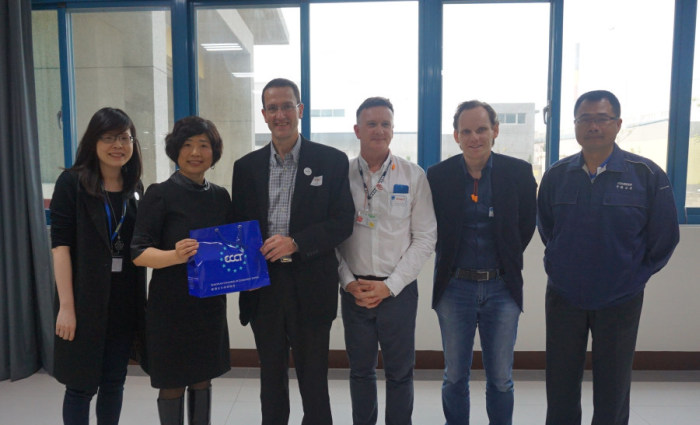Central Taiwan committee factory visit and BBQ

The tour provided an overview of IKEA's purchasing practices in East Asia, demonstrating the company's sustainability practices and how they assist local suppliers to improve their sustainability practices.
The trip began at the offices and factory of Founder Aluminium, one of IKEA's suppliers of aluminium and other products and components. Guests were welcomed by the President of Founder, Mayer Lin and the General Manager Lin Win-dow.
After the welcome participants heard presentations by Founder staff about the company's operations and about IKEA's sustainability efforts by Stefan Karlsson, Sustainability Compliance Manager, Purchasing Operations Area East Asia, who was in Taiwan at the time but is based in Shenzhen, China.
Founder was established in 1978. It has a staff of 160 people. Its main products are aluminium frames and components for closets, tables and chairs. Much of the company's output is sold to IKEA but the company also sells products under its own brand Fafacasa. The company is continuously upgrading its production lines, including, in recent years, by using robots.
As one of IKEA's suppliers, Founder is obliged to follow IKEA's IWAY code of conduct, which has been formulated taking into account international standards, local laws and regulations, and best practices in the areas of human rights, labour rights and environmental protection.
For a company like Founder, the main focus of the implementation of the IWAY is ensuring workplace safety, the fair treatment of employees and reducing the impact on the environment.
Founder goes beyond basic labour laws in the way it takes care of its employees. Unlike many other companies in Taiwan, it pays the same wages and provides the same working conditions and standard of accommodation (dormitories) to employees doing the same job from foreign countries as it does for Taiwan nationals.
In addition, it negotiates and pays all fees charged by foreign and local labour brokers and agents. Labour brokers and agents are notorious for charging such exorbitant fees directly to workers, which frequently results in workers handing over up to two years' worth of their earnings to agents. By negotiating with agents and paying these fees for the foreign labourers, overall fees have been reduced considerably and a significant burden has been lifted from foreign labourers. In addition, IKEA also monitors compliance in terms of working within regulated hours, paying correct wages, providing regulated benefits and safe/healthy living conditions.
In terms of sustainability, in 2014 Founder installed a large array of solar panels on the roof of its main building. One third of the company's power needs are supplied by the panels. It also changed all lights in its offices and factories to energy-saving LEDs and upgraded its air compressors to reduce energy consumption.
In his presentation, Stefan Karlsson said that IKEA aims to have a positive impact on the world. He is part of a dedicated team that is working to make everything about IKEA's operations sustainable. Every aspect of the operations internally and those of suppliers is analysed at to see how more can be done with less, which raw materials have the least impact on the planet, how to reduce the use of raw materials and how energy can be saved.
In terms of materials, IKEA is constantly looking for ways to use fewer materials and use recycled materials to make products. As a retailer of furniture, IKEA is very much aware that wood is a precious and finite resource. The company is therefore taking a number of actions in recognition of this. For example, it only uses wood that is certified as coming from well-managed and sustainable forests. It is also looking for ways to reduce the use of water in the manufacturing process. It also encourages water saving by consumers by selling water-saving taps in its stores.
Saving energy and converting to renewable energy sources is one of the company's major initiatives. More than half of its stores have solar rooftops. The company plans to increase the percentage of energy derived from renewable sources to 100% by 2020. The company's long term ambition is to be energy positive, that is, to produce more renewable energy than it consumes.
Besides solar panels, the company is investing in wind farms in Europe and the United States. It owns more than 300 wind turbines. It is also working to reduce its environmental footprint from transport by using more electric vehicles or liquid natural gas (LNG) vehicles.
While upfront costs of following the IWAY code-of-conduct are not insignificant, the long-term tangible and intangible benefits are substantial. Going green ultimately reduces the cost of materials and energy while treating employees well boosts morale and health, results in higher productivity and lower staff turnover.
After the presentations, participants were taken on a tour of Founder's production facilities and its furniture museum. After the tour, a Q&A session was held with Founder's general manager and president where they answered questions about how the company is continuously improving its sustainability.
At the conclusion of the Q&A, guests were transported by bus to IKEA's store where they enjoyed a buffet barbeque dinner and drinks. The evening gave ECCT members with business interests in Central Taiwan the chance to meet and mingle with fellow members in a relaxed setting.
